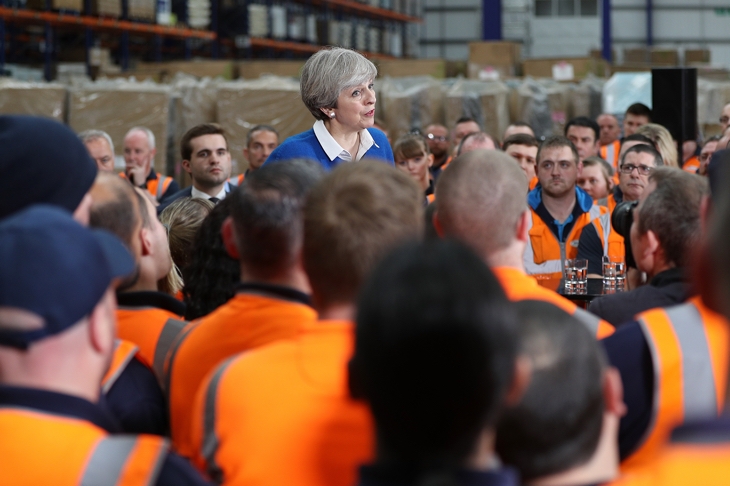Prime Minister, I have good news and bad news.
The good news is that you have been denounced in the letters page of the Daily Telegraph. One correspondent huffs: ‘I wonder if Theresa May and her small group of advisers closeted in Westminster are aware of the fact that each initiative they introduce in an attempt to win over traditional Labour voters risks having the opposite effect on traditional Conservative voters.’ Another damns your energy price cap as ‘wrong-headed’ and even accuses you of ‘play[ing] into the hands of Jeremy Corbyn’s muddle-headed electioneering economics’. Lord Tebbit echoes these fears: ‘The further Labour goes Left, that would mean the further we go Left. We need to stick to sensible, Conservative economics.’ If anyone appreciates sensible conservatism, it’s Norman Tebbit.
Of course, there is a narrow sliver of public opinion to the right of Jeremy Corbyn and the left of Norman Tebbit. It’s called ‘the country’. That the Prime Minister has Tory ultras worried is a sure sign she is winning over the middle ground. But holding the centre is not enough in this election; she must give moderate left voters an alternative to retro Bennism. This she seems keen to do but, and here is where the bad news comes in, she’s going about it the wrong way.
An energy price cap and new rights for workers are reasonable policies. They are light on detail and where detail is provided neither appears as radical as at first glance, but they speak to Labour voters’ most pressing concerns. That doesn’t mean they’ll be enough to break what for some is the habit of a lifetime and vote Tory. Nor is it sufficient to point derisively at Corbyn’s economic incoherence or political clumsiness. To get Labour supporters to vote Tory, Theresa May must remind them why they supported Labour in the first place.
The Prime Minister should dedicate a speech to this task. It should ignore Conservative voters — the C-word itself should be uttered sparingly — and talk directly to Labour people. She should tell a hard truth and an easy truth about the Labour party.
The hard truth is that Labour is a great party that has done great things. In the 1940s, it salved the wounds of war with the NHS; in the 1960s, it made Britain more equal and more tolerant; in the Blair years, Labour brought radical social and constitutional change while lifting children and pensioners out of poverty. May should acknowledge that, though she disagrees with their politics, Clement Attlee and Jennie Lee, Denis Healey and Barbara Castle were patriots who, along with countless Labour men and women, made Britain a better, fairer place to live.
The easy truth is this: the party of Jeremy Corbyn is not the Labour party anymore. It has been captured by a cult of cruel dreamers who put their socialism of sentiment ahead of the practical business of politics. They believe in social justice too much to let the voters taint it; the poor must indulge the enlightened rich their ideological comforts. Theresa May should not shy away from telling the truth about Corbyn — his history of IRA apologism, of associating with Islamists, of making common cause with anti-Semites. The problem isn’t that he’s incompetent but that he’s morally illiterate. She should describe a party whose leading lights now include admirers of Bobby Sands and habitual baiters of British Jews, and ask Labour voters: is this your Labour party?
Theresa May should contend that, far from being too Labour, Corbyn isn’t Labour at all. He is betraying a proud party and, worse, the people who have always looked to it to stand up for their interests. Lend me your vote on June 8, her appeal ought to go, and I will do my all to make life better for you and your family. When he was seeking the Labor party leadership, Australian prime minister Paul Keating told a colleague: ‘I don’t just want your vote; I want your soul.’ May’s pitch to Labour voters should invert this: I am not asking you to become a Tory, I’m offering you a Tory party you can vote for.
And then she had better be prepared to deliver on it.
Stephen Daisley is a columnist for the Scottish Daily Mail.







Comments